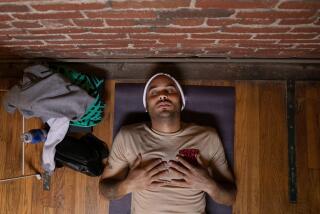Swingin’ in the Stacks : Touting their new album, Branford Marsalis and dad Ellis use improv skills when a local concert date falls through.
- Share via
Branford Marsalis, resplendent in chartreuse pants with a gray and yellow plaid jacket to match, stands next to a bookcase and spins out a brief, warmup flourish on his soprano saxophone. Nearby, seated at a grand piano placed in the performance area of the Borders Books in Westwood, is his father, Ellis Marsalis.
“All right, what are we doing?” says Branford, looking toward the piano. Then, answering his own question: “We’re playing some songs, I guess.”
Branford looks over at his father, nods his head, and Ellis digs into the brisk, rhythmic chording of “Little Liza Jane.” A moment later, Branford joins in, picking up the theme and skimming lightly across the tune.
The audience, which had been waiting patiently for nearly an hour on Wednesday night for the Marsalises to arrive, sways with the music. Heads nodding gently in sync with the rhythm, the packed crowd--an indefinably eclectic mix of age, race and sex--taps deeply into the smooth and easy sounds, smiling happily during the lyrical melodies, keeping time with fingers and feet, occasionally shaking their heads in astonishment over a particularly virtuosic passage.
Other songs follow, all drawn from the new Marsalis album, “Loved Ones,” which is devoted to “the romantic effect of ladies upon American songwriters”: the Gershwins’ “Bess, Oh Where’s My Bess,” Burwell & Parish’s “Sweet Lorraine,” Bernstein and Sondheim’s “Maria.”
At one point, the elder Marsalis, 61, ever the music educator with his deep, magisterial voice and large, authoritative presence, explains the importance of the lyrics, of a song’s story--even for instrumental jazz musicians.
“How can you play a ballad, or a love song, if you don’t know the words?” he asks.
The Marsalises’ appearance at Borders came about when a Los Angeles-area concert performance was unexpectedly canceled due to promotional problems. Concerned that the duo, with a new recording hitting the charts, might have to bypass the lucrative Southland market, Columbia Records and the musicians’ management quickly organized the free Borders in-store show, as well as a seminar for music students at Cal State Northridge.
“It’s cool with me,” said the ebullient Branford, 35, as he sat with his father at a desk in the store’s music department, signing albums after the performance. “I love bookstores. And I scored some mad Shakespeare. ‘Richard II,’ ‘Much Ado About Nothing.’ You should see what I have in my bookbag.”
Then, with a laugh, he added, “How about this, man? We could do a tour of bookstores all across the country. And not get paid, but get whatever books and CDs we want wherever we perform. It’s a great barter. I could go for that.”
*
The lineup for autographs snaked between the aisles for more than an hour after the performance.
Amazingly, one person showed up with the yearbook for Branford’s 1977 high school graduating class in New Orleans. “Look at this, man,” Branford said to his father. Flipping through the pages, he found a picture of Ellis, who had been a music teacher at the time. “There you are!”
Someone else carried a large painting he had done of the Marsalises, using the publicity photo for the Borders flier as a model. “They both signed it,” said the artist proudly, “and Ellis gave me his address so I can send him a copy of the picture!”
Others brought anything they could find--CDs, tapes, publicity cards, photos, even a book by younger brother Wynton Marsalis.
When the long queue of fans finally came to an end, it was time for a CNN camera crew to have its turn with the obliging musicians. Responding to each question, no matter how seemingly trivial, with warmth and sincerity, elaborating on the details, the Marsalises were model subjects. One could easily imagine them exchanging quips with Larry King.
Beyond the music, the autographs and the publicity were several subtexts. Why were the two Marsalises, the eldest son and the patriarch of the clan often described as the First Family of Jazz, performing in a bookstore?
Why not? The Marsalises are simply doing what more and more performers are doing, discovering that bookstores such as Borders and Barnes & Noble, music shops such as Tower Records, Hear Music and the Virgin Superstore, and coffee chains such as Starbucks are becoming viable arenas to reach new audiences.
Another subtext was Branford’s performance, his first in Los Angeles since he left the post of musical director of Jay Leno’s “Tonight Show” early in 1995. In the interim, he moved to New York to be closer to his young son, and the professional and personal changes clearly appear to have produced positive results.
“It’s one thing if you’re in a situation where you’re acting, and you’re paid to be a character,” Branford said. “But it’s a whole other thing when you’re living in an environment where you have to play a role, as you--you know, with your name. And the fact is that I never really saw Branford Marsalis as a character. I saw him as I was--as I am.
“Now I am who I am again. And a lot of what was happening when I was living in Los Angeles was setting the table for the growth that I experienced when I went back to New York.”
The final subtext was the unique, father-son performance combination--a rarity in jazz or, for that matter, in most of the arts. Both expressed the view that there is no generation gap, musically or emotionally, between them.
But Branford also noted that the musical encounter has come, for him, at a time of unusual personal growth.
“It’s great to be in a situation where I can be around my father and confront him as a man, not as a boy,” he said. “I mean, we danced around each other for a number of years, because my father never saw eye-to-eye with me about my choice in music, or my methods in how I learned. But now, working on this music together, he’s had to confront my ideas about music, and a lot of what we do with the songs is based on my ideas.”
Branford looked over at his father as the stoic Ellis simply cocked a quizzical eyebrow.
“Of course,” Branford added, “he never lets me forget something he always used to say when we were kids. ‘Son,’ he told us, ‘the thing you are going to have to learn is that life has a foot for every butt.’ ”
More to Read
The biggest entertainment stories
Get our big stories about Hollywood, film, television, music, arts, culture and more right in your inbox as soon as they publish.
You may occasionally receive promotional content from the Los Angeles Times.










